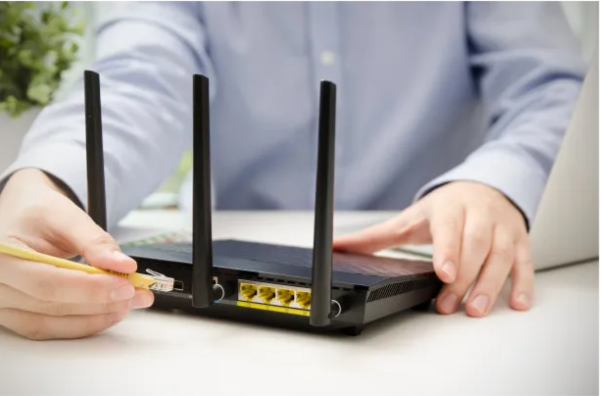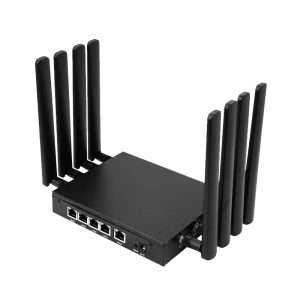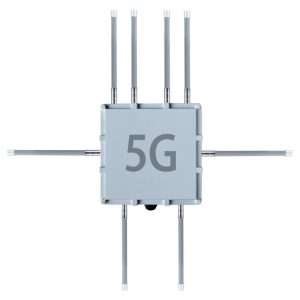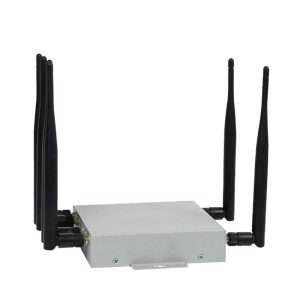جهاز توجيه صناعي 5G 5G
A جهاز توجيه خلوي صناعي 5G 5G is a specialized device designed to provide reliable and secure internet connectivity for industrial applications using 5G cellular networks. Key features of 5G industrial routers include:
1、Support for 5G NR (New Radio) sub-6 GHz frequencies, enabling faster data speeds up to 4.67 Gbps
2、Compatibility with 4G LTE and 3G networks for fallback connectivity, particularly useful for 5G cellular modem routers in areas with limited 5G coverage3、Rugged, industrial-grade design to withstand harsh environments like extreme temperatures, vibrations, and moisture
4、Multiple wired and wireless interfaces such as Ethernet, serial ports, I/O, and Wi-Fi, with 5G Wireless Routers offering enhanced flexibility for connecting mobile or temporary industrial setups
5、Advanced security features like firewalls, VPNs, and access control lists to protect industrial networks
Remote management capabilities for easy configuration and monitoring

Considerations when selecting a 5G industrial router
When selecting a 5G industrial router, several critical factors must be considered, including performance metrics (such as bandwidth and latency), security features (like VPN and encryption), sustainability concerns, and performance analysis. Below is a detailed exploration of these considerations.
Performance Metrics
– Bandwidth
5G technology offers significantly higher bandwidth compared to previous generations, enabling faster data transmission and supporting more devices simultaneously. Industrial applications often require high data throughput for real-time data processing and analytics. For instance, high speed 5g router can deliver speeds of up to 10 Gbps, which is essential for applications like remote monitoring and automated control systems in manufacturing.
– Latency
Latency is another crucial performance metric, especially for time-sensitive applications such as robotics and autonomous vehicles. 5G networks can achieve ultra-low latency (as low as 1 ms), which is vital for ensuring timely communication between devices and systems. 5G cellular modem routers leverage this capability to enable real-time decision-making in industrial automation.
ميزات الأمان
– VPN and Encryption
Security is paramount in industrial applications where sensitive data is transmitted over networks. A جهاز توجيه الإنترنت 5g 5g should integrate Virtual Private Network (VPN) capabilities to ensure secure remote access. Additionally, strong encryption protocols must be employed to protect data integrity and confidentiality during transmission. Many modern routers come equipped with built-in firewalls and advanced security features to mitigate risks associated with cyber threats.
– Cybersecurity Measures
Beyond VPNs and encryption, comprehensive cybersecurity measures are necessary to defend against unauthorized access and attacks. Features such as intrusion detection systems (IDS) and regular software updates play a crucial role in maintaining the security posture of the network, especially for 5G mobile routers exposed to public networks during field deployments.
Sustainability Concerns
As industries increasingly focus on sustainability, the environmental impact of technology becomes a significant consideration. When selecting a 5g wifi router, look for energy-efficient models that minimize power consumption while providing high performance. Additionally, consider manufacturers that prioritize sustainable practices in their production processes, such as using recyclable materials or reducing waste during manufacturing.
Performance Analysis
– Monitoring and Management Tools
Effective performance analysis tools are essential for maintaining optimal operation of 5G industrial routers. These tools allow for real-time monitoring of network performance metrics such as bandwidth usage, latency, and error rates. Advanced routers may offer features like network slicing, which allows different types of traffic to be prioritized based on specific needs—ensuring critical applications receive the necessary resources without interruption.
– قابلية التوسع
The ability to scale operations seamlessly is another important factor. As business needs evolve, the selected 5g cellular wifi router should support additional devices and increased bandwidth without requiring significant infrastructure changes. This scalability ensures that the investment remains viable over time as demands grow.
We are true to ourselves, and commit to always perform at our best.
5G industrial router recommended by HUASIFEI
Installation Guide for 5g Industrial Router
5G industrial routers applications

Smart Manufacturing
In smart manufacturing, 5G routers facilitate the transition to Industry 4.0 by providing robust connectivity for a wide array of devices, including sensors, robots, and machinery. This connectivity supports:
Real-Time Monitoring: 5G routers enable continuous monitoring of equipment and production processes, allowing for immediate data analysis and decision-making. This leads to improved operational efficiency and reduced downtime through predictive maintenance.
Enhanced Automation: The low latency of 5G allows for quick responses between machines and control systems, which is crucial for automated processes. For instance, robotic systems can perform quality control inspections in real time using advanced visual recognition technologies.
Increased Flexibility: With 5G’s high capacity and speed, manufacturers can quickly repurpose tools and robots to adapt to changing production needs. This flexibility supports mass customization and on-demand manufacturing.
Internet of Things (IoT) Solutions
5G routers are integral to IoT ecosystems by connecting numerous devices seamlessly:
Data Collection and Analysis: The ability to connect a large number of IoT devices allows for comprehensive data collection from various sensors across the manufacturing floor. This data can be analyzed to optimize production patterns and resource allocation.
Remote Management: Industrial 5G routers enable remote access to machines and systems, allowing operators to manage operations without being physically present. This capability is enhanced by cloud-based platforms that support device management and maintenance tasks remotely.


Intelligent Transportation 5G Router Systems
In intelligent transportation systems, 5G routers enhance logistics and fleet management:
Real-Time Tracking: 5G networks improve the tracking of goods in transit by providing real-time updates on location and status. This capability is vital for logistics companies aiming to optimize delivery routes and reduce delays.
Autonomous Vehicles: The high-speed connectivity supports communication between autonomous vehicles and infrastructure, enabling them to respond swiftly to changing traffic conditions. This is crucial for safety and efficiency in transportation networks.
Remote 5G Router Monitoring and Management
Remote monitoring capabilities are significantly enhanced by 5G technology:
Emergency Response: In critical situations, 5G routers provide stable connections for emergency command platforms, enabling quick decision-making through video conferencing and real-time data sharing.
Operational Efficiency: The integration of advanced monitoring tools with 5G connectivity allows organizations to maintain oversight over operations from any location. This capability reduces the need for on-site personnel while ensuring safety and compliance.

General Information on Openwrt Router
5G Industrial Router Installation Process
Preparation: Before installation, it’s crucial to understand the router’s specifications and ensure compatibility with existing devices. Gather necessary tools such as network cables, power adapters, and SIM cards if applicable.
Physical Setup:
– Location: Choose a suitable location for the router that allows for good airflow and protection from dust and moisture.
– Power Connection: Connect the router to a power source.
– Network Connection: If using a cellular connection, insert the SIM card. Connect any required antennas according to the model specifications.
Accessing Configuration Interface:
– Use a computer to connect to the router via Ethernet cable.
– Access the router’s web management interface using its IP address (commonly 192.168.1.1) and log in with the default credentials.
Configuration:
– Configure network settings such as IP address, subnet mask, default gateway, and DNS servers.
– Set up security features including firewall settings and user accounts.
– Advanced configurations may include Quality of Service (QoS) settings or load balancing depending on network needs.
Testing: After configuration, restart the router and perform tests to ensure it operates correctly within the network environment.
How does a 5G industrial router ensure network security
Access Control and Authentication: 5G industrial routers implement strict access control measures, ensuring that only authorized devices and users can connect to the network. This often includes user authentication protocols that verify identities before granting access.
Data Encryption: The routers utilize encryption protocols to secure data in transit. For instance, session keys are derived for encrypting and protecting the integrity of traffic between devices and the network, which is critical for safeguarding sensitive industrial data.
Virtual Isolation: Many routers support virtual LANs (VLANs) and other segmentation techniques that isolate different types of traffic. This minimizes the risk of unauthorized access and ensures that sensitive data remains protected from potential breaches.
Firewall Protection: Integrated firewalls help monitor incoming and outgoing traffic, blocking malicious attempts to access the network. This is crucial in preventing cyber threats that could disrupt operations or compromise data integrity.
VPN Support: Virtual Private Network (VPN) capabilities allow secure remote access to the network, enabling safe data transmission over public networks while maintaining confidentiality and integrity.
DDoS Protection: Some routers include mechanisms to protect against Distributed Denial-of-Service (DDoS) attacks, which can overwhelm network resources and disrupt services. This feature is increasingly important as 5G networks expand the attack surface due to their higher bandwidth capabilities.
Secure Management Interfaces: The management interfaces of these routers are designed to be secure, often requiring encrypted connections (like HTTPS) for configuration and monitoring tasks. This prevents unauthorized access during administrative operations.
Robust Hardware Design: Industrial routers are built to withstand harsh environmental conditions, which also contributes to their reliability and security. They are designed to operate in extreme temperatures, humidity, and vibrations without compromising performance or security measures.
Regular Updates and Patching: Manufacturers often provide firmware updates that include security patches to address vulnerabilities as they are discovered, ensuring ongoing protection against emerging threats.









